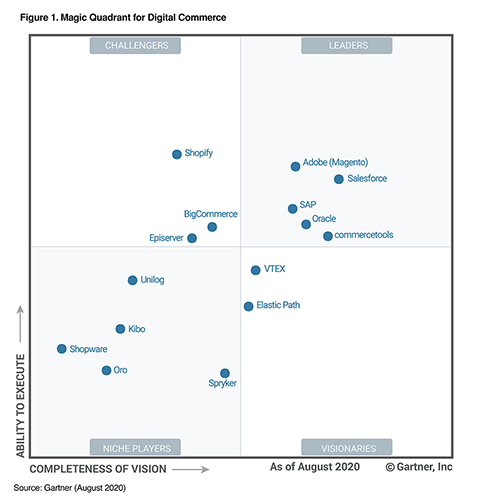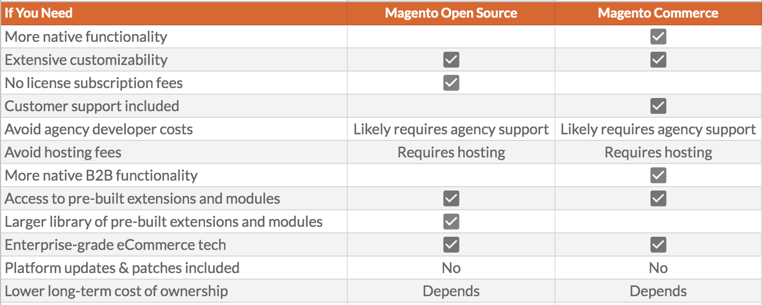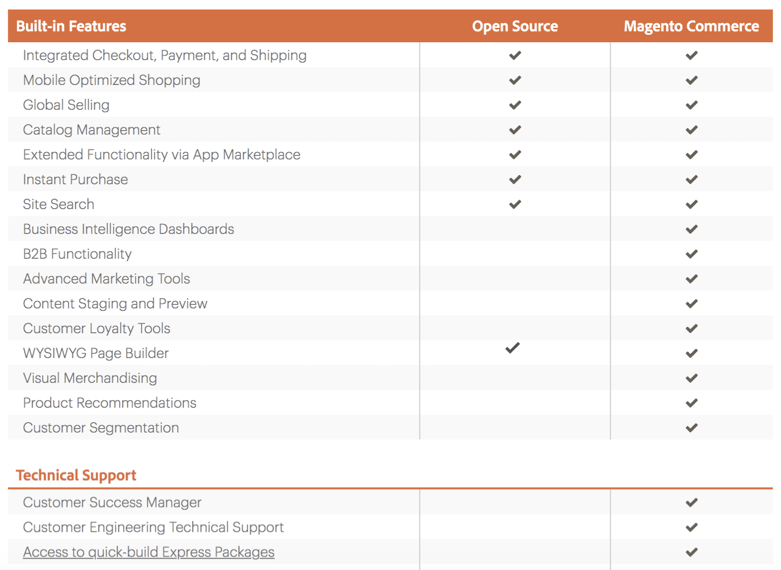eCommerce Platform Pricing: Adobe Commerce Cloud & Magento Open Source
Find an eCommerce solution that fits both your needs and budget with this guide comparing the pricing of Magento Open Source and Adobe Commerce.

If you’ve found your way to this article, chances are you’re either looking to build a new eCommerce store or thinking of re-platforming your existing one. You’ve most likely heard the name Magento, and not surprisingly so - it is the force behind countless online businesses, including eCommerce giants such as Nike, HP, and Nespresso. Globally, over 270,000 merchants choose Magento development, and in 2020 global eCommerce sales on the Magento platform reached $224 billion.
Is Magento right for your business? Every year, Gartner Research releases various surveys highlighting the relative value of different platforms designed for a specific purpose. Adobe’s Magento is consistently positioned as a leader in their Digital Commerce survey - this is certainly a vote in favor of strong consideration!

In order to understand if Magento is the right eCommerce platform for your business, it is important to understand the available platform options. Adobe, the owner of the Magento platform, currently offers three versions of its eCommerce platform:
In this article, we will focus on Magento Open Source and Adobe Commerce powered by Magento. While the cloud version offers some interesting features on its own, the core differences are between Magento Open Source and Adobe Commerce.
* Magento was acquired by Adobe in 2018, and in 2021 Adobe rebranded the award-winning Commerce platform as "Adobe Commerce powered by Magento." However, for the purposes of this article, we’re sticking with the simpler "Magento Commerce."
For some, this table will be enough to point them in the right direction. But, for those who need a bit more detail, read on!

Magento made its mark in the eCommerce world for three primary reasons:
All of these features remain today in both platforms, but from there, each takes a slightly different path offering distinct value in terms of costs, functionality, and support.
When compared to Open Source, Magento Commerce offers greater native functionality out-of-the-box. Achieving the same functionality in Magento Open Source would require implementing either pre-built extensions or custom-built modules. Magento Commerce also comes with a license fee, while Magento Open Source does not. First, we’ll dig into the Magento Commerce features, and then we’ll review the total cost of ownership for each platform.
The table below highlights the key features included in Magento Commerce.

The features included in Magento Commerce allow for all-around store management. Store promotion is handled by advanced marketing tools, as well as a content staging and preview tool. Average order value can also be boosted using product recommendations, which utilizes AI to track customer behavior and adjust product suggestions, as well as customer loyalty tools, which allow for managing and enabling functions such as reward points, gifts, wish lists, or sales events.
Magento Commerce has also been updated to put a new emphasis on supporting B2B users with the following B2B-specific features:
These are some of the highlights featured in Magento Commerce and not native to Magento Open Source. If this list includes functionality essential to your business, Magento Commerce is worth your serious consideration.
Open Source does not benefit from this native functionality and, for functionality beyond the core platform, requires additional work to implement pre-built or custom extensions.
The beauty of any Magento platform is the superior flexibility you have in meeting your own unique design, functional, and performance needs. Both Magento Commerce and Magento Open Source allow you to install pre-built extensions as well as custom elements. As outlined above, Magento Commerce has a head start with its native functionality, and you pay for it via license fees. If you’re not interested in those added native elements in Magento Commerce, your money may be better spent investing in pre-built or custom extensions that meet your specific business needs.
The Magento community of developers and agencies is responsible for building almost 4,000 extensions for the platform. As of this writing, the Magento store offers 3,953 extensions for Magento Open Source and 1,863 for Magento Commerce. Right now, the store offers over 1,200 free extensions as well as a few heavy-duty integrations that range in price from $6,500 to $15,000. In the world of pre-built extensions, it is important to note: regardless of the extension license fee, there are often developer costs associated with integrating front end and back end elements with your existing Magento installation.
Often, there is a pre-built extension for each of your particular needs. However, many businesses have very specific business requirements that demand custom work. This is frequently the case for legacy system integrations or unique business process functionality. In these cases, it is important to work with an experienced Magento developer who follows industry and Magento best practices for coding, testing, and implementation. In most cases, custom development is both time-consuming and expensive if done well.
Whether using pre-built extensions or custom builds, future Magento updates from Adobe may require additional support to make sure your specific add-ons continue to work as planned. The more add-ons, the more resources you will need to allocate for the long-term sustainability of your entire Magento implementation.
With Magento Open Source, there is no official support provided by Adobe. Rather, the primary source of support is your partner agency. Training, platform configuration and optimization, extension implementation, customizations, and ongoing support are all delivered by your agency of choice. Perhaps more than any other eCommerce platform, making the right agency selection is critical to your success.
The Magento Commerce license subscription fee includes a customer support package with 24/7 support from an assigned customer success manager. This person will help you boost the potential of your store by creating dedicated training programs, supporting you with making the best decisions for your store, and being your person of contact on the Adobe Commerce team. Moreover, an account manager is available to assist you as well as redirect you to valuable resources.
Importantly, however, Adobe does not provide technical support, implementation services, or customization work. For this reason, the primary costs associated with the long-term maintenance of your website will still be the work done by your support partner agency.
Magento Commerce is only available to licensed subscribers who pay a defined monthly fee. The specific fee structure depends on the gross annual revenue of your business.
For businesses that generate less than $1 million in online revenue, the Magento Commerce license fee starts at $22,000 annually. Beyond $1 million in online revenue, the pricing increases as your revenue grows. As with Magento Open Source, any agency work would be on top of these fees.
Magento Commerce, in its pure form, will keep your long-term support costs lower, as fewer customizations will make upgrades and patches a more efficient process.
One of the biggest attractions of Magento Open Source is its free license. If you don’t see the value in the added native functionality of Magento Commerce or the customer support it provides, your investment would best be put toward elements of your platform you truly need and can benefit from.
With Magento Open Source, your costs don’t adjust to your revenue - they stay constant according to your defined agency support plan and whatever development you may choose to build.
The biggest takeaway from this piece should be that it’s possible to build a functional, responsive, and converting website using either Magento Open Source or Magento Commerce!
At the end of the day, your decision will largely depend on understanding your unique business needs and ensuring you can see a clear path to supporting those needs with your solution of choice.
Because of the reasons listed in this article and many more, we believe Magento is an exceptional choice for building modern online stores. Supported by an ever-growing, passionate community of developers, agencies, and Adobe itself, it will no doubt continue to be one of the best digital commerce platforms for years to come.
Click here to learn how to lower your Magento website's total cost of ownership.
Regardless of which platform you choose, if you’re interested in achieving the greatest functional benefit and lowest total cost of ownership, the following three ideas are worth considering:
IronPlane specializes in helping commerce companies to choose the right Magento development strategy for their business needs. Our robust custom Magento solutions are built on cutting-edge technologies, which can both optimize your website and boost its performance. We can also advise you on whether your potential investment in Magento Commerce is worthwhile from an ROI perspective.
Learn more about IronPlane’s Magento Development services here and contact us for a free consultation.

Find an eCommerce solution that fits both your needs and budget with this guide comparing the pricing of Magento Open Source and Adobe Commerce.

Learn how to lower the total cost of ownership of your Magento eCommerce website. Get insights and strategies to optimize your Magento development costs.

Deciding between BigCommerce & Magento? Our post explains the differences between each eCommerce solution so you can make an informed decision.